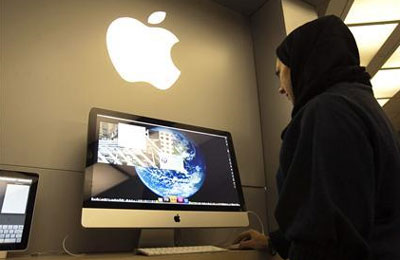
Despite sanctions, Apple gear booms in Iran
Dubai, July 13, 2012
Despite the embargo on US computer products in Iran, an estimated 100 stores in Tehran openly sell the latest Apple gear including the iPad, iPhones, iPods, laptops, all-in-one desktop computers and more, a report said.
'Business has been booming for the last three years,' said Majid Tavassoli, owner of RadanMac, one such store in a phone interview.
He said his company employs more than 20 staffers and has been supplying Apple products to Iranian buyers since 1995.
Iran's booming Apple business underscores the limitations of economic sanctions by the US and other countries. Washington and its allies have imposed sanctions in an attempt to curb Iran's nuclear programme, which Tehran maintains is peaceful. US companies are barred from selling any goods or services to Iran unless they obtain special authorization.
The focus of the sanctions has been on Iran's banks and oil industry, Iranian individuals and companies that Western capitals believe are assisting what they suspect is Tehran's drive towards a nuclear weapons capability.
But US consumer products and computer equipment are another matter. Although they are banned, enterprising Iranian merchants continue to source them through underground trade routes in the Middle East and beyond.
In the case of Apple, some digital sales of music, videos and software go directly through the California company - via its iTunes and App Store online services. According to Tehran computer dealers, Iran is a rapidly growing market for software downloads: Iranians register Apple accounts with randomly-chosen addresses outside the country, and use foreign gift-cards to pay for purchases.
In response, a spokesman for Apple referred Reuters to its export control policy that restricts it or any subsidiaries it owns from exporting any products to Iran.
Once considered rare and sought-after, iPhones and iPads are now de rigueur in Iran among those who can afford them. The epicentre of the trade is Tehran's largest technology mall, the bustling Capital Computer Complex, where more than 350 traders supply products for Iran's increasingly tech-savvy population.
One of RadanMac's competitors is a smaller firm called Apple Iran. Its website is a nearly exact replica of Apple's own, except for the Persian language and a disclaimer: 'This website is not in any way affiliated with Apple Inc.' Apple has been attempting to shut it down, according to a person familiar with the matter.
'We're really proud of it,' says Apple Iran spokesman Ali Afghah, an Apple enthusiast and author of a Farsi-language study on the history of the company.
'I'm known as the Apple guy by friends and family,' said the 28-year-old, who bought his first Apple computer in 2002 and now describes himself as a 'Mac-head.'
'It was different then,' he said. 'The products were around double the price.'
Like RadanMac, Apple Iran boasts an impressive cast of corporate customers for its services. Along with major Iranian banks, they have included IRIB - Iran's state broadcasting network - newspapers and magazines, Afghah said.
'There must be at least 1,000 editors in Iran now using Macs, if not more,' he estimated.
Neither government officials nor editors responded to requests for comment on whether they used Apple technology.
In recent months, Afghah said, Apple Iran has seen sales decline because of tough new sanctions imposed by the U.S. and its allies against Iran's financial sector. The new measures have caused Iran's currency, the rial, to plummet and made international payments from Iranian banks much more complex.
The company relies on a steady stream of creative individuals - including musicians, film editors and photographers - to keep its business going.
Tavassoli set up RadanMac - in Farsi, the word 'radan' means 'the one who does everything correctly' - after his employer, a Middle Eastern computer company, pulled out of Iran. He had worked there as a service engineer for Apple products.
Left with the company's spare parts, he said he invested a few thousand dollars and spent the next 15 years combining his love of Apple technology with trying to make a living out of it.
'To start with, it was really tough,' said the 51-year-old. 'Four of my colleagues gave up and moved back to the States. But I love what I do.'
Despite the sanctions, Tavassoli said there was no shortage of business because of Iranians' love for the latest technology. Still, sales come with major headaches and taking big investment risks.
Prices often remain competitive with authorized Apple dealers outside Iran. The lowest spec MacBook Pro was priced in Tehran this month at around $1,250, compared to $1,200 (before tax) for the slightly updated model in New York.
This is significantly cheaper than buying the product in many European capitals. The fluctuations in Iran's volatile open market dollar rate mean that prices change every day.
Apple dealers in Iran often manage to obtain the company's newest models within weeks of their release and at reasonable prices. The latest releases also show up sooner via opportunistic travelers who purchase them abroad and resell them at highly inflated prices. – Reuters







